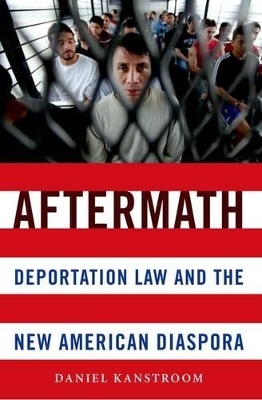
Aftermath
Deportation Law and the New American Diaspora
Seiten
2014
Oxford University Press Inc (Verlag)
978-0-19-933142-0 (ISBN)
Oxford University Press Inc (Verlag)
978-0-19-933142-0 (ISBN)
In Aftermath, immigration and deport expert Daniel Kanstroom reveals the rarely-discussed effects of deportation under the United States' current system: the actual effects on individuals, families, U.S. communities, and the countries that must process and repatriate ever-increasing numbers of U.S. deportees.
Since 1996, when new, harsher deportation laws went into effect, the United States has deported millions of noncitizens back to their countries of origin. While the rights of immigrants-with or without legal status--as well as the appropriate pathway to legal status are the subject of much debate, hardly any attention has been paid to what actually happens to deportees once they "pass beyond our aid." In fact, we have fostered a new diaspora of deportees, many of whom are alone and isolated, with strong ties to their former communities in the United States.
Daniel Kanstroom, author of the authoritative history of deportation, Deportation Nation, turns his attention here to the current deportation system of the United States and especially deportation's aftermath: the actual effects on individuals, families, U.S. communities, and the countries that must process and repatriate ever-increasing numbers of U.S. deportees. Few know that once deportees have been expelled to places like Guatemala, Cambodia, Haiti, and El Salvador, many face severe hardship, persecution and, in extreme instances, even death.
Addressing a wide range of political, social, and legal issues, Kanstroom considers whether our deportation system "works" in any meaningful sense. He also asks a number of under-examined legal and philosophical questions: What is the relationship between the "rule of law" and the border? Where do rights begin and end? Do (or should) deportees ever have a "right to return"? After demonstrating that deportation in the U.S. remains an anachronistic, ad hoc, legally questionable affair, the book concludes with specific reform proposals for a more humane and rational deportation system.
Since 1996, when new, harsher deportation laws went into effect, the United States has deported millions of noncitizens back to their countries of origin. While the rights of immigrants-with or without legal status--as well as the appropriate pathway to legal status are the subject of much debate, hardly any attention has been paid to what actually happens to deportees once they "pass beyond our aid." In fact, we have fostered a new diaspora of deportees, many of whom are alone and isolated, with strong ties to their former communities in the United States.
Daniel Kanstroom, author of the authoritative history of deportation, Deportation Nation, turns his attention here to the current deportation system of the United States and especially deportation's aftermath: the actual effects on individuals, families, U.S. communities, and the countries that must process and repatriate ever-increasing numbers of U.S. deportees. Few know that once deportees have been expelled to places like Guatemala, Cambodia, Haiti, and El Salvador, many face severe hardship, persecution and, in extreme instances, even death.
Addressing a wide range of political, social, and legal issues, Kanstroom considers whether our deportation system "works" in any meaningful sense. He also asks a number of under-examined legal and philosophical questions: What is the relationship between the "rule of law" and the border? Where do rights begin and end? Do (or should) deportees ever have a "right to return"? After demonstrating that deportation in the U.S. remains an anachronistic, ad hoc, legally questionable affair, the book concludes with specific reform proposals for a more humane and rational deportation system.
Daniel Kanstroom is Professor of Law at Boston College and author of Deportation Nation: Outsiders in American History.
PREFACE ; INTRODUCTION ; 1. THE GOALS AND ACCOMPLISHMENTS OF THE DEPORTATION SYSTEM ; 2. PROBLEMS WITHIN THE DEPORTATION SYSTEM ; 3. THE EFFECTS OF DEPORTATION ON INDIVIDUALS, FAMILIES, ; AND COMMUNITIES ; 4. THE RULE OF LAW AND ITS BORDERS: DEPORTEES AND ; THE SPACE/TIME CONTINUUM ; 5. RECONCEPTUALIZING THE RULE OF DEPORTATION AND ; POST-DEPORTATION LAW
| Verlagsort | New York |
|---|---|
| Sprache | englisch |
| Maße | 226 x 150 mm |
| Gewicht | 363 g |
| Themenwelt | Recht / Steuern ► EU / Internationales Recht |
| Recht / Steuern ► Öffentliches Recht ► Besonderes Verwaltungsrecht | |
| Recht / Steuern ► Öffentliches Recht ► Völkerrecht | |
| Sozialwissenschaften ► Politik / Verwaltung | |
| ISBN-10 | 0-19-933142-1 / 0199331421 |
| ISBN-13 | 978-0-19-933142-0 / 9780199331420 |
| Zustand | Neuware |
| Haben Sie eine Frage zum Produkt? |
Mehr entdecken
aus dem Bereich
aus dem Bereich
Grundwerk ohne Fortsetzung. Rechtsstand: 1. September 2024. …
Buch | Hardcover (2024)
C. H. Beck (Verlag)
CHF 109,95
Polizei- und Ordnungsrecht, Kommunalrecht, mit Bezügen zum …
Buch | Softcover (2021)
Vahlen, Franz (Verlag)
CHF 36,25
Handbuch des Wirtschaftsstraf- und -ordnungswidrigkeitenrechts
Buch | Hardcover (2024)
Verlag Dr. Otto Schmidt KG
CHF 348,55


